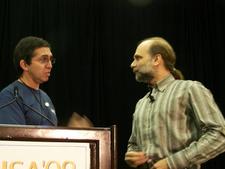USENIX LISA: Security Theater Plays a Role - Bruce Schneier's Keynote
The opening keynote Thursday of the USENIX LISA conference in San Diego was by author and security expert Bruce Schneier. In his opinion "perceived security" should be an aspect of all security implementation.
The large conference room was packed at Schneier's presentation, "Reconceptualizing Security." In one of his first slides, he pointed out that security has always been one of the basic human instincts by showing the part of the brain known as the amygdala where the emotion of fear (and its opposite, security) is seated. Schneier joked that "the newer part of the human brain responsible for heuristics is still in beta." He undermined the discrepancy between subjective feelings and provable facts with a few examples. Deviating from his slides and presentation material, he relied mainly on his words and gestures. "Security is at one time feeling and reality," according to his thesis, "You can feel safe without actually being safe, and you can feel unsafe for no apparent reason."
Schneier applied his thesis to a phenomenon he called "security theater." As an example he used the safety screw cap, designed to quell any fear that the content of the bottle might have been tampered with. He could think of at least ten ways that the content could be compromised, mentioning a syringe for one. Nevertheless, tamper-proof bottles provide an objective sense of security, which proved a saving grace for the medication industry after some well known poisoning incidents. Schneier felt that "as technicians, we kid ourselves that the security for which we're responsible is reliabable. That isn't true. We forget that humans play a major role."
Ignoring the emotional part of security is wrong in Schneier's judgment, and he advises technicians to incorporate the "security theater" concept in their work. Responding to a question about statistics, he suggested that they have little effect: "People who know statistics think they work better, but they don't." According to him, security models should adhere closely to reality, while recognizing that reality is mutable. His conclusion: "It's only when the feeling and the reality of security converge that we have real security."
Subscribe to our Linux Newsletters
Find Linux and Open Source Jobs
Subscribe to our ADMIN Newsletters
Support Our Work
Linux Magazine content is made possible with support from readers like you. Please consider contributing when you’ve found an article to be beneficial.

News
-
Chaos Comes to KDE in KaOS
KaOS devs are making a major change to the distribution, and it all comes down to one system.
-
New Linux Botnet Discovered
The SSHStalker botnet uses IRC C2 to control systems via legacy Linux kernel exploits.
-
The Next Linux Kernel Turns 7.0
Linus Torvalds has announced that after Linux kernel 6.19, we'll finally reach the 7.0 iteration stage.
-
Linux From Scratch Drops SysVinit Support
LFS will no longer support SysVinit.
-
LibreOffice 26.2 Now Available
With new features, improvements, and bug fixes, LibreOffice 26.2 delivers a modern, polished office suite without compromise.
-
Linux Kernel Project Releases Project Continuity Document
What happens to Linux when there's no Linus? It's a question many of us have asked over the years, and it seems it's also on the minds of the Linux kernel project.
-
Mecha Systems Introduces Linux Handheld
Mecha Systems has revealed its Mecha Comet, a new handheld computer powered by – you guessed it – Linux.
-
MX Linux 25.1 Features Dual Init System ISO
The latest release of MX Linux caters to lovers of two different init systems and even offers instructions on how to transition.
-
Photoshop on Linux?
A developer has patched Wine so that it'll run specific versions of Photoshop that depend on Adobe Creative Cloud.
-
Linux Mint 22.3 Now Available with New Tools
Linux Mint 22.3 has been released with a pair of new tools for system admins and some pretty cool new features.

